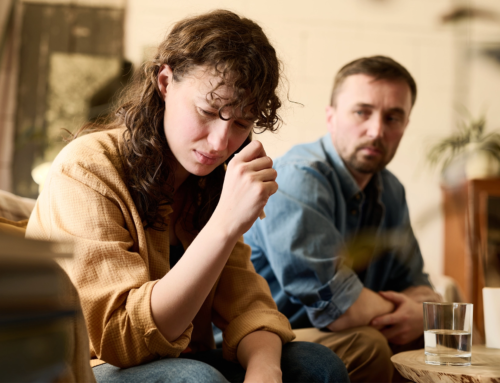
What to Expect in Couples Counselling
Couples counselling is often misunderstood. Many people think it’s a last resort before separation, but in truth, it’s a proactive way to strengthen a relationship. Whether you’re facing ongoing conflict, feeling emotionally distant, or simply wanting to build healthier patterns, couples therapy offers tools and guidance to help you and your partner grow together.
At Rosen Couples Counselling in Vaughan, Ontario, the focus is on creating a safe and supportive space where partners can openly discuss challenges and rebuild connections. If you’ve ever wondered what actually happens in counselling sessions, this guide walks you through what to expect from start to finish.
Related Article: When One Partner Wants Out: What Marriage Counselling Can (and Can’t) Do
Why Couples Choose Counselling
Most couples don’t arrive at therapy out of the blue. There are usually patterns or experiences that signal it’s time to seek professional help.
Common reasons include frequent arguments that never resolve, trust issues after betrayal, or a growing emotional gap. Life transitions like becoming parents, moving, or career stress can also put strain on a relationship. In some cases, partners may feel so disconnected that separation or divorce is already on the table.
Choosing counselling doesn’t mean failure. It’s a sign of commitment—proof that you’re willing to invest in learning better ways to relate to one another.
Related Article: How to Talk to Your Partner About Counselling
The First Step: Initial Consultation
The journey usually begins with an initial consultation. This first session is all about introductions and setting the stage. The therapist listens to both partners’ perspectives and gathers information about the relationship’s history, current struggles, and goals.
You can expect questions like:
- What made you decide to come to counselling now?
- What do you hope to achieve through therapy?
- How do you usually handle conflict at home?
This stage isn’t about solving problems right away. It’s about building trust with your therapist and ensuring both partners feel heard.
Assessing the Relationship
Once the background is clear, the therapist may conduct an assessment. This could involve open conversations, guided questions, or even written questionnaires. The purpose is to uncover communication styles, recurring conflict patterns, and each partner’s emotional needs.
Assessment isn’t about blame. Instead, it’s a way to map out how the relationship functions and identify areas where small shifts could make a big difference.
Related Article: When Is the Right Time for Marriage Counselling?
Setting Goals Together
After assessment, the therapist helps you and your partner set goals for counselling. These may be very specific, like rebuilding trust after infidelity, or broader, like improving communication and deepening emotional connection.
Clear goals give direction to the therapy process. They also ensure that both partners are on the same page about what success looks like.
Inside the Therapy Room
Most sessions last around 50 to 60 minutes. At the beginning, couples often meet weekly to maintain momentum. Over time, sessions may shift to bi-weekly or monthly check-ins as progress is made.
In each meeting, the therapist facilitates conversation so that both partners feel safe expressing themselves. Expect structured dialogue, exercises, and guidance rather than casual chatting. While every couple’s experience is unique, there are several techniques commonly used.

Techniques You’ll Learn
Therapists use proven strategies to help couples break negative cycles and replace them with healthier habits. Some of the most common include:
- Active Listening: One partner speaks while the other listens without interruption, then reflects back what they heard. This reduces misunderstandings.
- I-Statements: Instead of saying “You never listen,” partners are encouraged to phrase feelings as “I feel unheard when…” to reduce defensiveness.
- Validation: Acknowledging a partner’s feelings, even when you disagree, builds safety and empathy.
- Role Reversal: Temporarily taking each other’s perspective helps develop compassion and a deeper understanding.
- Time-Outs: When conflict escalates, learning to pause and return to the conversation later prevents destructive arguments.
- Check-Ins: Regular emotional check-ins keep communication flowing and stop resentment from piling up.
- Expressing Appreciation: Highlighting what you value in each other creates a more positive tone.
These strategies are often paired with homework exercises so you can practise them in everyday life.
Related Article: How to Improve Listening with Couples Therapy
Skills Development Over Time
Beyond conflict management, therapy is also about building long-term relationship skills. Couples learn how to regulate emotions during disagreements, negotiate solutions that respect both perspectives, and strengthen intimacy.
A key goal is to shift the mindset from “me versus you” to “us versus the problem.” By working as a team, couples are better equipped to handle challenges together rather than turning against each other.
Tracking Progress
Throughout therapy, your therapist will check in on how things are going. This might involve reflecting on recent successes, discussing obstacles, or revisiting your goals. Adjustments are made as needed so the process stays relevant and effective.
Progress isn’t always linear. Some sessions may feel harder than others, especially when sensitive issues are addressed. But these moments often lead to breakthroughs when both partners commit to staying engaged.
When Counselling Wraps Up
Most couples complete therapy within six to twelve sessions, though the timeline varies depending on the complexity of the issues. When major goals have been met, the therapist will help you plan for the future.
This might include:
- Occasional follow-up sessions to keep progress on track
- Strategies for maintaining open communication at home
- Reminders to revisit the skills you’ve learned when new challenges arise
Ending counselling doesn’t mean the work stops. It means you’ve gained tools you can continue applying to strengthen your bond.
The Role of Homework and Practice
One of the unique aspects of couples counselling is the emphasis on practice outside the therapy room. Therapists often assign exercises like communication drills, scheduled “date nights,” or reflection journals.
These tasks aren’t busywork—they’re meant to reinforce what you learn in sessions and help you integrate new habits into daily life. Couples who commit to practising between appointments usually see faster and more lasting progress.
Practical Considerations
Many couples worry about logistics before starting therapy. Here are some helpful things to know:
- Session Length: Typically 50 to 60 minutes.
- Number of Sessions: Often 6 to 12, but flexible depending on your situation.
- Frequency: Weekly at first, then spaced out as progress builds.
- Accessibility: Evening and weekend appointments are often available for busy couples.
- Insurance: Many workplace benefit plans cover counselling, making it more affordable.
Knowing these details upfront can reduce stress and make it easier to focus on the relationship work itself.

Common Misconceptions About Couples Counselling
It’s normal to feel nervous before starting therapy. Misconceptions can fuel this anxiety. Let’s clear up a few:
- “The therapist will take sides.” In reality, counsellors remain neutral. Their job is to support both partners equally.
- “Counselling is only for couples in crisis.” Many couples seek therapy proactively to strengthen their bond, not just to fix problems.
- “It’s about finding out who’s right.” Therapy isn’t about winning arguments—it’s about learning healthier ways to relate.
- “We’ll have to rehash every fight.” While past conflicts may come up, the focus is on moving forward with practical solutions.
By addressing these myths, couples can enter counselling with a clearer and more open mindset.
Building a Stronger Future Together
Couples counselling isn’t a magic fix, but it offers something powerful: structure, support, and skills that can transform how partners relate to each other. With guided conversations, practical exercises, and consistent effort, couples learn to listen better, argue less destructively, and reconnect emotionally.
If you’re considering couples counselling in Vaughan, Rosen Couples Counselling provides a supportive environment where both partners feel respected and understood. With evening and weekend sessions and coverage through many workplace insurance plans, professional help is within reach.
FAQs About Couples Counselling
- How do I know if couples counselling is right for us?
If you and your partner are struggling with communication, conflict resolution, trust, or emotional closeness—or simply want to strengthen your bond—counselling can help.
- What if my partner doesn’t want to attend counselling?
It’s common for one partner to feel hesitant. Many counsellors offer an initial session to explain the process and ease concerns, helping reluctant partners feel more comfortable.
- Can couples counselling still work if we’re already considering separation?
Yes. Counselling can provide clarity—whether that means rebuilding the relationship with new tools or reaching an amicable, respectful decision about separation.
- Is everything we say in sessions confidential?
Yes. Counsellors are bound by professional confidentiality. What you share stays private, except in rare cases where safety is at risk.
- Do counsellors only focus on problems, or do they also highlight strengths?
Both. While challenges are addressed, counsellors also help couples recognize what’s working well, reinforcing positive habits that support long-term growth.
- What if one partner doesn’t want to open up in counselling?
This is common. A skilled therapist creates a safe, neutral space where both partners feel heard. Over time, even reluctant partners usually feel more comfortable sharing.
- Can counselling help if trust has already been broken?
Yes. Rebuilding trust is one of the most common goals in couples therapy. With guided conversations and practical tools, many couples find a way forward after betrayal or dishonesty.
- Is it better to start couples counselling before things get really bad?
Absolutely. Counselling isn’t just for crisis—it’s often most effective when couples seek help early, before patterns become too entrenched.
Moving Forward with Confidence
Relationships take effort, and every couple faces challenges. What matters is how you choose to handle them. Counselling shows that growth is possible, even when things feel stuck.
If you’re ready to invest in your relationship, take the first step today. Reach out to Rosen Couples Counselling and discover how guided support can help you and your partner build a stronger, healthier connection.



